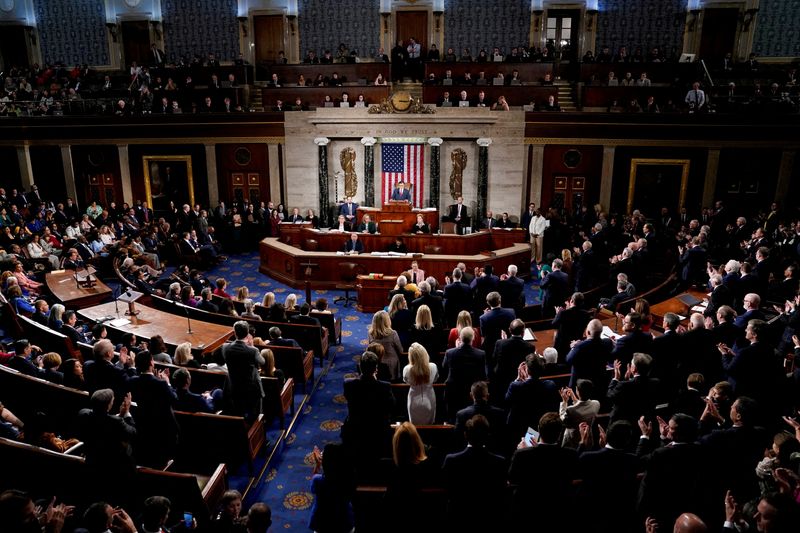By David Morgan
WASHINGTON (Reuters) - Republicans who control the U.S. House of Representatives are trying to overcome internal differences on how to pay for President Donald Trump's sweeping tax cuts, with hardline conservatives determined to reduce an annual federal deficit approaching $2 trillion.
With a narrow 218-215 House majority, they need near-total unity as they prepare to vote within weeks on a fiscal 2025 budget resolution that will be a critical step toward passing Trump's sprawling agenda of tax cuts, border and immigration reform, energy deregulation and increased military spending.
Ahead of a three-day policy retreat that kicks off in Miami on Monday, some worried openly that House Speaker Mike Johnson's leadership team might balk at the spending cuts needed to offset the cost of Trump's $6 trillion tax-cut agenda while also addressing the nation's more than $36 trillion in debt.
Republicans have vowed to extend Trump's tax cuts from the 2017 Tax Cuts and Jobs Act, or TCJA, which are set to expire at the end of this year. The nonpartisan Committee for a Responsible Federal Budget estimates that doing so would cost more than $4 trillion over ten years, while Trump campaign pledges to eliminate taxes on tips, overtime and Social Security benefits could cost another $1.8 trillion.
Failure to reach agreement could trip up Republican lawmakers' plan to pass Trump's agenda by the end of May, using a maneuver to bypass Senate Democrats that will require almost all of the fractious majority to agree.
"Most of us support the TCJA. I don't think that's the issue. We all want to support what President Trump is doing. But we also recognize the need to get our fiscal house in order," said Representative Michael Cloud, a member of the hardline House Freedom Caucus.
"We've got to have a course correction, and it's got to be dramatic," he told Reuters.
Johnson said he hopes to finalize components of a single sprawling legislative package to fund Trump priorities. Republicans must also decide whether to include an increase in the federal government's debt ceiling -- which Congress must do later this year to avoid a devastating default -- and disaster relief for Los Angeles communities devastated by wildfires.
"There are a number of ideas on the table," Johnson told reporters before lawmakers left Washington last week, saying his caucus aimed to reach agreement in Miami.
House Democratic leader Hakeem Jeffries blasted Republican plans as "a contract against America." He warned: "It will hurt working families, hurt the middle class, hurt our children, hurt our seniors and hurt our veterans."
Jeffries also said the Republican agenda would undermine the Medicaid healthcare program for the poor, as well as government-subsidized healthcare for uninsured workers under the Affordable Care Act.
COST OF TRUMP AGENDA
Republicans say they face a major challenge finding enough spending cuts to cover the cost of the Trump agenda and worry privately that hardliners' insistence on significant deficit reduction could harm their constituents by reducing Medicaid funding for hospitals and outlays for other community services.
"This thing cannot be deficit neutral," said Republican Representative Ralph Norman, adding that the package would need to reduce the deficit "to the tune of a big number."
Another potential roadblock: The rising U.S. deficit is weighing on the bond market, pushing the nation's borrowing costs higher. A significant deepening of the deficit could add to those worries.
'THIS IS AN EQUAL BODY'
The debate will test which is more powerful -- Trump's demands or hardliners' will to hold to a traditional Republican goal of cutting the deficit.
"The president said very clearly what he wants. Now the question is, what do we want? This is an equal body ... We're supposed to have different opinions. If we don’t, we're in trouble, because we're no longer a constitutional republic, said Representative Richard McCormick (NYSE:MKC).
The House Budget Committee has circulated a 50-page menu of proposals that includes trillions of dollars ranging from ideas widely supported in the party, such as repealing green energy tax credits, to the controversial, including the federal home mortgage interest deduction.
A proposal to raise $1.9 trillion from a 10% tariff on imported goods, which Trump has proposed, also faces opposition from House and Senate conservatives.
"I'm not in favor of raising taxes. Tariffs are simply a tax," said Republican Senator Rand Paul, a leading fiscal hawk.

Even as Republicans try to edge toward agreement, Representative Tim Burchett said he worries that up to $200 billion in proposed additional funding for the Pentagon could absorb savings that he would rather use to address the deficit. But he stopped short of saying that such an outcome would lead him to oppose the package.
"If I see us trending in the right direction, that might be enough," Burchett said. "But again, we're lying to ourselves, and we're lying to the public. We go home and say, we're going to do these things. And then we come up here and wink and nod and sell the people down the river. And we go home and get reelected. It's a crazy system."